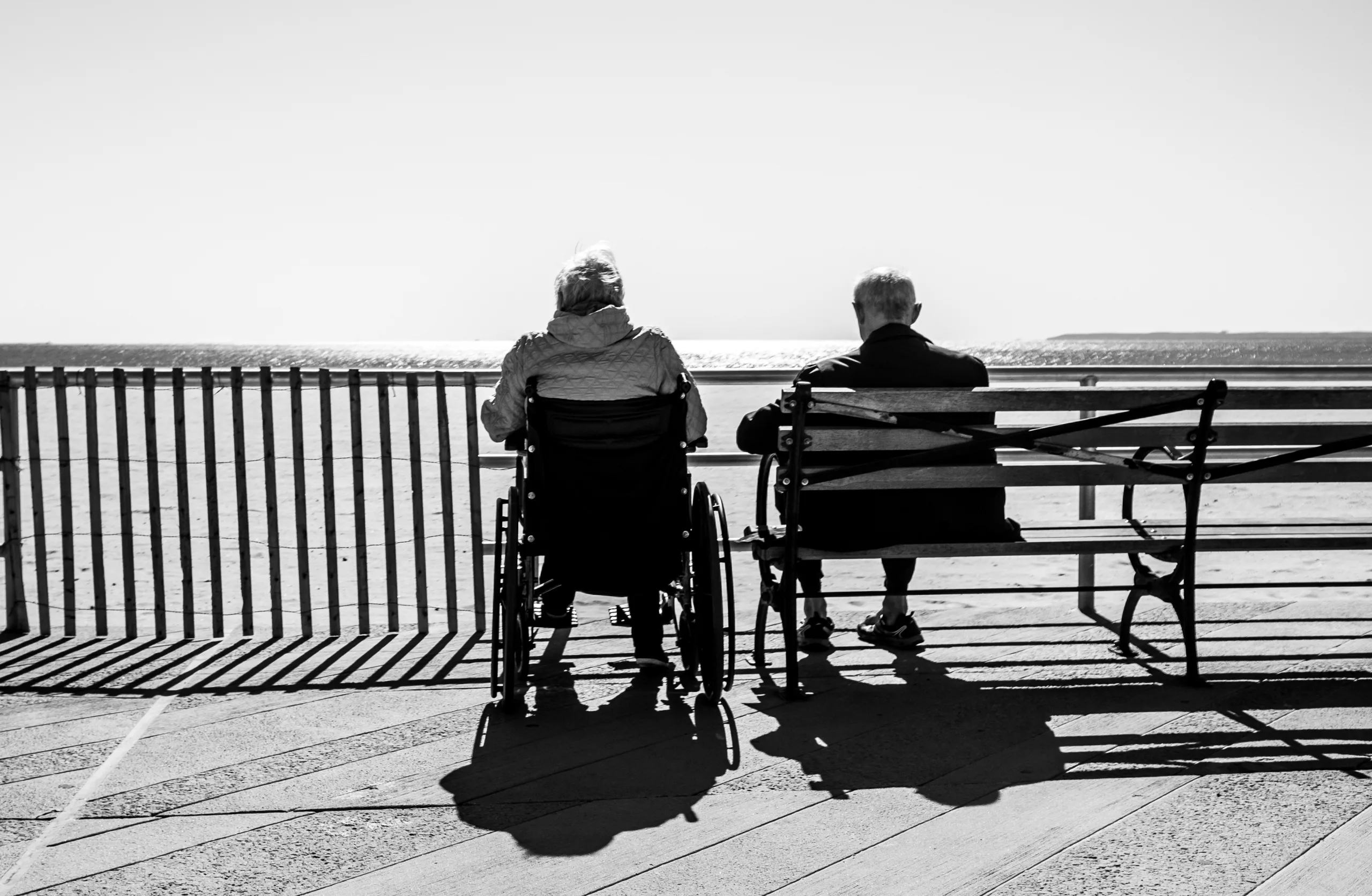As life expectancy increases, ageing is more often accompanied by extended poor health, making it more difficult for families to support older relatives. Image credit: Bruno Aguirre, via Unsplash.
Isn’t modern medicine great? You need only scroll through this magazine to find examples of extraordinary research with the potential for tremendous health benefits.
However, I believe that on one fundamental level medicine in the UK and across much of the world is flawed. And given that the number of people over 85 will double in the next 25 years, the need for change has never been more urgent.
The way society and medicine deal with death is always evolving. Historically, the elderly remained (and remain to this day in many cultures) the head of the family until death. It was common for parents to be looked after by their children, no matter what care they needed. In the UK today, old age has become private, institutionalised—even embarrassing. Improved medicine and increased life expectancy is one reason for this change. It is now far more common for death to be preceded by a long, gradual decline in health and abilities, which families often struggle to adapt to.
Shying away from the topic of death
Unsurprisingly, death is an uncomfortable subject. Families of the old or terminally ill—and even the “dying” themselves—are often unwilling to discuss the prospect of death, or their dying wishes, because this can feel like giving up. As an example, patients with terminal cancer diagnoses, who have suffered numerous rounds of unsuccessful treatment, often refuse to switch to hospice or palliative care. They opt instead, quite understandably, to pin their hopes on the next drugs in the long list of therapies, each less likely to work than the last and each bringing further nasty side effects.
The trouble is, life expectancy with terminal diseases or in old age has a long tail, with a tiny percentage of patients defying death for many years. Who wouldn’t desperately hope to be on that tail? Doctors are the same: a Chicago study asked around 500 doctors to estimate how long a terminally ill patient in their care would survive, and the average answer was an overestimate of 530%. Sadly, the relentless pursuit of a chance at a long life can come at the expense of the quality of the time left, due to the heavy toll of many treatments.

Reprinted from “Remaining Lifetime After Recognition of Terminal Illness Depends on Diagnosis: A Nationwide Population-Based Cohort Study,” by Bell, P. V. et al., 2017. This work is licensed under the Elsevier Non-Commercial License.
Another consequence of our unwillingness to accept and talk about death is the all-too-common failure to discuss the end-of-life wishes of an elderly or terminally ill loved one. We find reasons not to have “the talk”, until a sudden event, such as a stroke, prevents them from expressing their wishes.
This can be problematic for everyone involved. Families can be put under a tremendous burden as medical professionals look to them to make enormous decisions on behalf of their loved one. The individual themselves who would perhaps choose to live their final moments peacefully and in comfort may instead die with their ribs snapped by CPR efforts, and a tube down their throat.
The nursing home problem
Death is not the only stage of life we shy away from. Ageing, and the associated decline in abilities, is also an uncomfortable subject. When ageing relatives can no longer live safely and independently in their own homes, due to the accumulation of comorbidities (multiple, often chronic diseases) and frailty, coupled with the risk of falls, it is common to move them into a nursing home. The logic seems sound—move them from somewhere they are not safe, to somewhere they are.
But nursing homes tend to share this safety-first mentality, which can come at the expense of a full and meaningful life. Alongside resource limitations and the need for efficiency, the same patterns tend to emerge in nursing homes: the spheres of sleep, eating, work, and play entirely overlap. These activities occur in the same place, with the same people, under the same authority. Individuals have little privacy, autonomy, or choice, and are at least in part isolated from wider society. Sociologists would call this a “total institution”, of which another example is a prison.
Working weekends in a nursing home showed me that even in the most expensive places where resident health and safety are paramount, a tragically significant proportion of residents feel helpless or even trapped. For me, the reason is clear: sure, they are being cared for, but what about the things that give them meaning and fulfilment? All too often, their wishes and passions are quietly and perhaps patronisingly swept under the rug—and so they lose not only their autonomy, but their sense of purpose.
People have suggested to me that homes ought to provide more activities like music or art lessons. While these sorts of activities have their place, they are just entertainment, and do not provide a deeper sense of fulfilment for everyone. Of course for some, activities like regular interactions with grandchildren can offer fulfilment, but in my experience, such visits are seldom frequent enough to provide purpose to life single-handedly. Autonomy and purpose are fundamental human requirements. To quote the eminent American surgeon and writer Atul Gawande in his excellent book Being Mortal, ‘all we ask is to be allowed to remain the writers of our own story.’
An accepting and open approach to death is invaluable
To address a society-wide problem around how we deal with ageing and death, the solution inevitably involves significant cultural change. Crucially, we must talk more openly about death with our older or terminally ill relatives and identify their wishes, fears, and priorities, to help them navigate this difficult but no less valuable stage of their lives.
People facing death must also be empowered to talk about it, even if their loved ones are at first unwilling to contemplate their mortality. These conversations are very difficult, and require different approaches for everyone. But if we can just bring ourselves not to shy away from the subject of dying, we can make sure that everyone lives the remainder of their lives to the fullest—whatever that means to them.
It is also worth saying that while medicine must always have a role to play in ageing, terminal illness, and death, governments and institutions (such as the NHS) need to reconsider their approach. Modern medicine has great power, but it must be wielded carefully. As an old proverb goes, ‘To every man is given the key to the gates of heaven; the same key opens the gates of hell’. Medicine is our key, and we need to be careful to use it correctly, or else it can inflict harm rather than do good.
A 2010 study on 151 stage IV lung cancer patients from Massachusetts illustrates this message. The patients were randomly assigned either to continue receiving their oncology treatment, or to receive this care in addition to visits from palliative care specialists. These specialists work to maximise quality of life, and discuss the patient’s priorities for if and when things get worse.
The first result was that those with palliative care stopped chemotherapy and started hospice earlier, and therefore experienced less suffering at the end of their lives. This alone should persuade us that more attention towards palliative care is needed. However, the second result was that, astonishingly, the patients who used palliative care and stopped oncology treatment sooner also lived for on average 25% longer.
Of course, this is just one small-scale study and doesn’t prove the cause of different life expectancies. But it nonetheless shows that where medicine, our powerful “key”, pursues curative treatment forever and fails to acknowledge death, it can inflict preventable suffering and potentially even shorten our lives.
We need nursing homes with different priorities
Lastly, we need to rethink nursing homes, designing them so that fulfilment and autonomy are prioritised. A perfect example is the experiment of American care home director, Bill Thomas, who in 1991 decided to act on the crushing lack of autonomy and purposefulness he saw among residents at his nursing home.
Thomas took on restrictive regulations and stubborn staff to fill his nursing home with life: he put living plants in every room, swapped a lawn for a vegetable patch, organised an after school club for the carers’ children, and brought in two dogs, four cats, 100 parakeets, rabbits, and hens. Residents pitched in by walking the dogs, adopting and feeding the parakeets, or working on the vegetable patch.
The results were numerous, but the gist was that previously withdrawn and sedentary residents found new purpose, spontaneity, and agency, perhaps a reason to live, in even the smallest of acts like feeding the birds. If the change in mood isn’t convincing enough, over two years the medical prescriptions per resident fell by half, and deaths by 15%. You can see why I find this idea so compelling—it need not be with animals, but if all nursing homes sought more innovative ways to maximise autonomy and genuine fulfilment for their residents, their quality, and possibly quantity, of life would be all the better for it.
Much of the change I describe is happening through initiatives and organisations like Eden Alternative UK which are taking steps in the right direction. But we must go further, faster, and together as a whole society if we are to take advantage of this opportunity to rethink how we use medicine, and how we deal with death and dying. The prize is a meaningful life for everyone—to the end. What could be more important?





